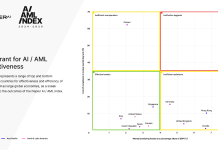In the world of financial institutions, misconfigured compliance rules can lead to hefty penalties costing up to $14.82m each year.
According to Flagright, that’s nearly three times the expense of maintaining proper compliance. These fines, coupled with business disruptions and reputational damage, underscore the severe impact of non-compliance.
To deal with this, Flagright has introduced Shadow Rules, a product addition to its rules engine enables AML professionals to conduct risk-free testing of configurations, ensuring their compliance measures are perfectly calibrated.
Since its launch, Shadow Rules has gained significant traction among its clientele. An impressive 65% of rules undergo testing as shadow rules before live implementation, with an average testing duration of one week. This ensures the highest levels of effectiveness and accuracy, marking a new era in compliance strategy implementation.
One of the standout outcomes from implementing Shadow Rules is the dramatic 80% decrease in false positive alerts, which are often the result of initial misconfigurations. This preventative measure allows for the detection and correction of errors in a controlled environment, saving between 3-8 hours per rule that would otherwise be spent addressing alerts caused by inaccuracies.
Flagright claims its clients have reported that they typically test up to three different configurations of a rule before finalising it for live deployment. This iterative process allows for the fine-tuning of rule parameters such as thresholds, velocities, and targeted transactions, which not only enhances efficiency but also significantly reduces the occurrence of false positives.
However, the risks of misconfigured rules are not just theoretical. Consider the plight of a mid-sized bank that incurred severe fines due to faulty AML rules. Without adequate testing, these rules generated numerous false positives, diverting the compliance team’s attention from genuine suspicious activities and allowing critical lapses in monitoring that led to penalties and damaged the bank’s reputation.
Shadow Rules serve as an essential best practice for compliance, offering a robust mechanism for mitigating risks associated with rule misconfiguration. By operating alongside live rules, they provide a preview of the potential impacts of new configurations, thus allowing real-time adjustments without the associated risks of live enforcement. This dual approach not only assures compliance but also maintains operational stability.
Practical applications of Shadow Rules are vast, claims Flagright. They are particularly useful when a financial institution introduces a new AML rule or needs to adjust existing ones. By deploying these rules as shadow rules, compliance teams can monitor real transaction data without triggering actual alerts, thereby optimising performance and ensuring adherence to new regulatory standards without disruption.
In conclusion, as the regulatory landscape continues to evolve, solutions like Shadow Rules are critical for future-proofing AML compliance. They not only prevent costly misconfigurations but also pave the way for more precise and efficient transaction monitoring across the financial sector.
Keep up with all the latest FinTech news here
Copyright © 2024 FinTech Global











